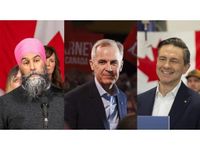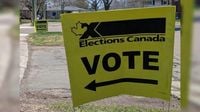As Canadians eagerly await the outcome of the federal election held on April 28, 2025, they are faced with significant issues such as US tariffs and the rising cost of living. Polls have closed across most of the nation, with voting continuing in western Canada until 7 PM Pacific Time (02:00 GMT). The election, characterized by a short but intense campaign, has seen voters choose who will lead the country through economic and diplomatic challenges, particularly in relation to the United States.
In Atlantic Canada, early results show the Conservatives outperforming expectations, especially in Newfoundland and Labrador. An hour after polls closed in the region, the Liberals were leading or elected in 22 of the 32 ridings, while the Conservatives secured 10 seats, and the New Democrats found themselves out of contention. This shift reflects a growing sentiment among East Coast voters, who seem ready to send a message to the governing Liberals, who have dominated the region since 2015.
Mark Carney, the Liberal leader and former Bank of Canada governor, called the election in March 2025, aiming to solidify the party's position amid declining support. By the time of the election, the Liberals had slipped to 23 seats in the region, while the Conservatives had risen to eight, demonstrating a significant political shift. Early projections indicated that the Conservatives were likely to win newly-named Acadia-Annapolis, where incumbent Chris D’Entrement was expected to secure a third term.
In Nova Scotia, the Liberals have taken a lead in the South Shore-St. Margaret’s riding, with incumbent Conservative Rick Perkins facing a tough challenge from Liberal candidate Jessica Fancy-Landry. Perkins has been in the role since 2021 and is looking to secure a second term. Meanwhile, in Central Nova, Conservative Brycen Jenkins has taken the lead over former Liberal MP Sean Fraser, who had initially decided not to run but changed his mind after a call from Carney.
Fraser's decision to re-enter the race has added an unpredictable element to the election, with many voters expressing concerns over US tariffs, affordability, and the local lobster fishery. As the election results come in, the CBC Decision Desk is working diligently to project outcomes based on the votes counted so far. The desk consists of two teams: one focusing on individual ridings and the other analyzing overall results to determine which party will form the government.
In Quebec, however, the election faced challenges due to bad weather conditions, which led to several voting offices in Nunavik closing early. Communities such as Salluit and Ivujuvik were unable to vote, prompting local leaders to express frustration over the situation. Ivujivik Mayor Adamie Kalingo stated, "We have neither ballots nor information on how to proceed [to vote] in this election," highlighting the unfairness faced by residents in these northern communities.
Despite these hurdles, the majority of polling stations across the country have closed, and results are beginning to flow in from over 200 ridings in Quebec, Ontario, Manitoba, Saskatchewan, Alberta, Nunavut, and the Northwest Territories. As of now, polling stations in British Columbia and Yukon remain open for another 30 minutes, allowing late voters to cast their ballots.
The election has also sparked discussions about electoral reform, an issue that Justin Trudeau previously promised to address but ultimately abandoned. Former B.C. NDP MP Randall Garrison emphasized that Canada’s first-past-the-post system has led to strategic voting, where many feel compelled to vote for a major party rather than their preferred candidate. Garrison argued, "Most advanced democracies have moved to proportional representation, where every vote actually counts toward getting representation." This sentiment resonates as voters grapple with the implications of their choices in the current election.
As results continue to emerge, the political landscape in Canada is shifting. The Conservatives are experiencing a notable increase in vote share in Atlantic Canada, a region where they have historically struggled. The party's leader, Pierre Poilievre, has focused his campaign on criticizing the Liberal government’s carbon pricing policy and the rising cost of living, which have resonated with voters concerned about their economic future.
In Newfoundland, early results indicated that the Conservatives were able to secure two seats, one of which was taken from the Liberals. The Long Range Mountains riding, previously held by Liberal cabinet minister Gudie Hutchings, saw Conservative Carol Anstey emerge victorious against Liberal candidate Don Bradshaw. This win, along with the Conservative hold on Central Newfoundland, marks a significant shift in voter sentiment in the region.
As the night progresses, the CBC is providing live coverage and updates on the election results, allowing Canadians to stay informed about the unfolding political landscape. The final seat count will determine whether the Liberals can maintain a majority government or if the Conservatives will capitalize on their momentum to gain control.
The stakes are high as Canadians reflect on the past decade of Liberal governance and consider the future direction of their country. With key issues like US tariffs and the cost of living at the forefront of voters' minds, the election results will undoubtedly shape the political discourse for years to come. As voters head to the polls, the anticipation of what lies ahead continues to build.





